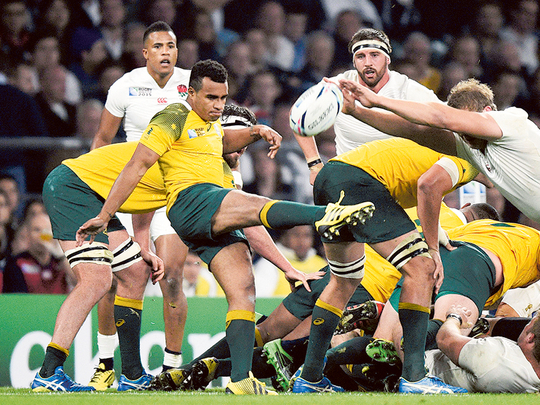
London: England’s Monday video analysis of their Twickenham horror show could run into Tuesday, such was the depth and breadth of Australia’s dominance in their overwhelming 33-13 Rugby World Cup victory.
England’s only major area of improvement from last week’s Wales defeat was discipline at the breakdown, where they were barely penalised on Saturday.
However, it counted for little because Australia did not need the referee’s help in that key area as they had their twin spoilers extraordinaire Michael Hooper and David Pocock to force their usual unequal share of turnovers.
That the Wallabies came out on top in that battle would have surprised nobody, but to see the English pack on the receiving end of the sort of scrum dusting they have routinely handed the Wallabies over the years was a real eye-opener.
Australia came into the match promising that they had improved their scrum, but then they always do. This time it was not empty rhetoric though and, by the last 10 minutes, England’s replacement-laden scrum was on roller skates and the disbelieving home fans were heading for the exits.
The wisely-timed intervention of former Australia coach Bob Dwyer certainly seemed to work its magic as French referee Roman Poite routinely warned England prop Joe Marler about not scrummaging straight, just as Dwyer had highlighted in the media in the build-up.
Marler, who had been spoken to by the officials in England’s previous two matches, this time found himself right in Poite’s crosshairs and he was eventually hauled to the bench seemingly to avoid him being sin-binned.
Though it must have stuck in his throat to say it, England’s World Cup-winning coach Clive Woodward declared: “The Aussie scrum was magnificent.”
England coach Stuart Lancaster bemoaned a few of the early scrum penalties that he felt were harsh on his team, but even he had to admit that “in the end we weren’t hard-done-to”.
So, if the back row and the scrum were dominated by Australia, England were always going to be in trouble hoping they could win the battle of the backs.
They couldn’t.
The two scything first-half tries by fly-half Bernard Foley were classic Wallaby scores, players prepared to take a risk by coming from deep at express pace, with fast hands and precise timing.
England never came close to matching that, their only try coming as a result of a remarkable burst of speed and determination by winger Anthony Watson.
Too often England’s backs received the ball while stationary and, while the second-half introduction of George Ford added some much-needed zest, the Wallabies were too street-wise to get drawn into an open, sevens-style contest and closed the game down in just the way England have loved to do over the years.
However, to dwell on England’s deficiencies is a disservice to Australia, who played with fearless ambition and technical brilliance to record the highest score and biggest margin of victory against England at Twickenham in the most pressurised environment many of them will ever have experienced.
“That was the complete performance, we really need to compliment Australia, it was clinical,” said former New Zealand scrum-half and captain Justin Marshall.
“They were high-tempo and effective in everything they did. I’ve not seen Australia play like that for that for two years.”








